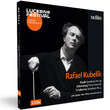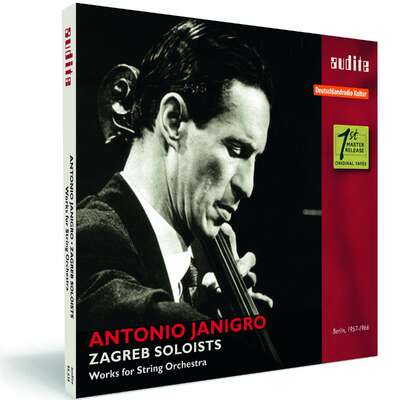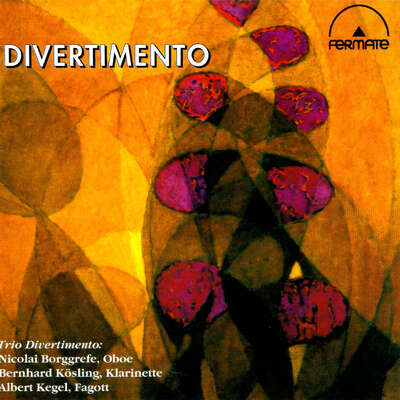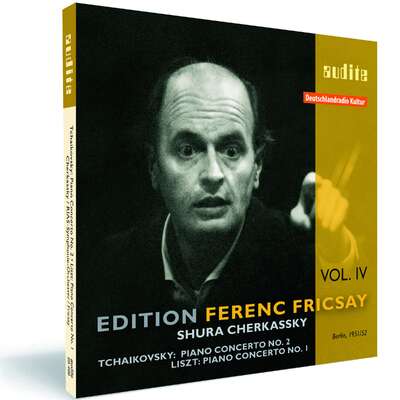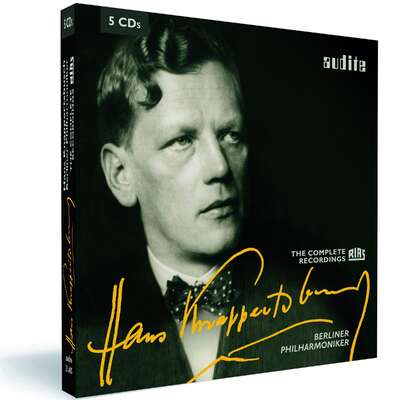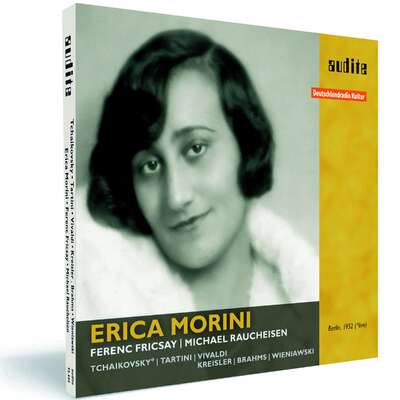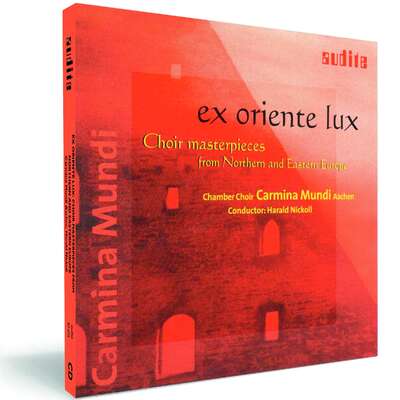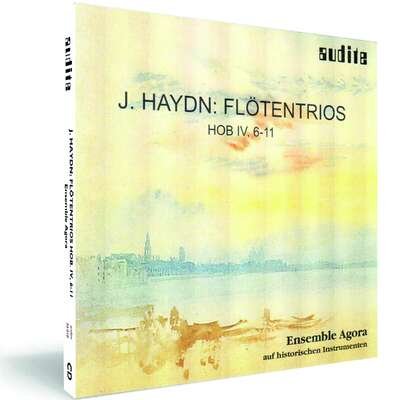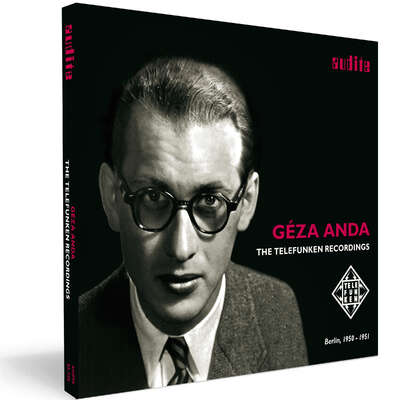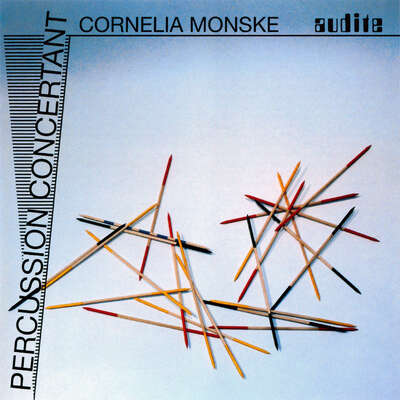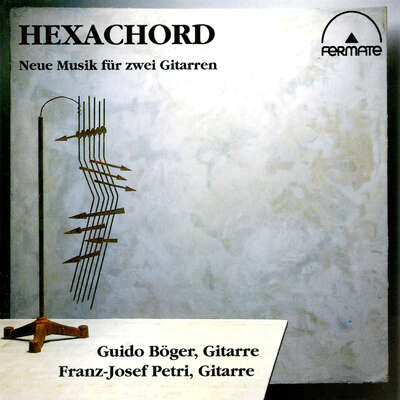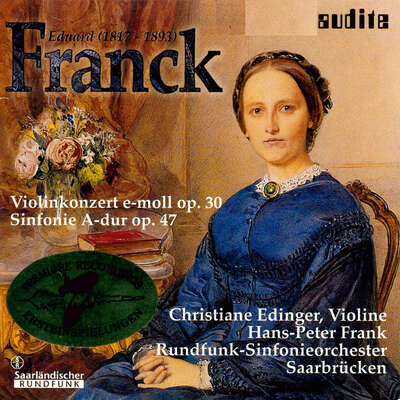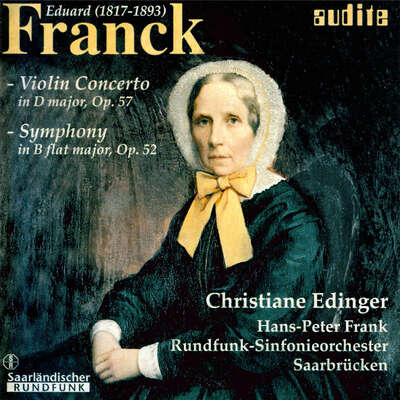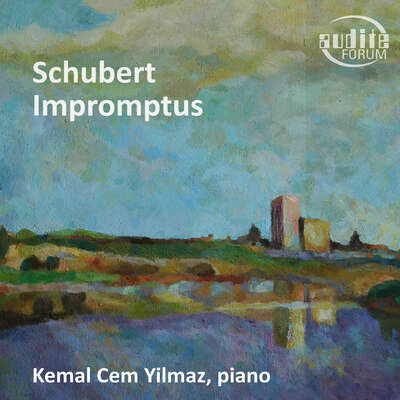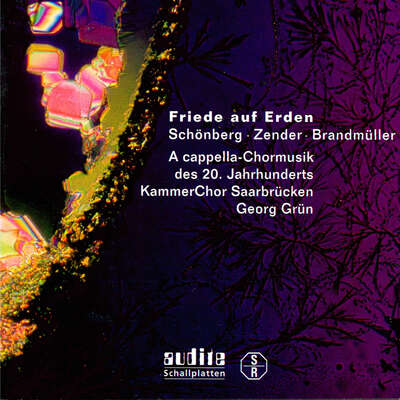
Auto-Rip
In the summer of 1968, a few days after the brutal suppression of the “Prague Spring”, the Czech émigré Rafael Kubelík conducted a gripping concert in his adopted home city of Lucerne: a Haydn Symphony, full of joie de vivre, and a passionately glowing account of Tchaikovsky’s Fourth Symphony frame Schoenberg’s Piano Concerto, played by the British piano legend John Ogdon in his only appearance at Lucerne Festival.more
"In between explosive passages bursting with energy, there are beautifully warm and colorful moments full of tenderness, and this spontaneous contrasting makes the music immensely exciting." (Pizzicato)
Track List
Details
|
Rafael Kubelík conducts Haydn, Schoenberg & Tchaikovsky
Lucerne Festival "Historic Performances", Vol. XVIII |
|
| article number: | 95.745 |
|---|---|
| EAN barcode: | 4022143957450 |
| price group: | BCA |
| release date: | 2. September 2022 |
| total time: | 84 min. |
Bonus Material
Informationen
In the summer of 1968, a few days after the brutal suppression of the "Prague Spring", the Czech émigré Rafael Kubelík conducted a gripping concert in his adopted home city of Lucerne: a Haydn Symphony, full of joie de vivre, and a passionately glowing account of Tchaikovsky's Fourth Symphony framed Schoenberg's Piano Concerto, played by the British piano legend John Ogdon in his only appearance at the Lucerne Festival.
"Kubelík championed the Tchaikovsky symphony as if it were a declaration of the victory of the spirit, of freedom over all the forces of fate", commented a critic following the closing concert of the Lucerne Summer Festival in 1968. The historical parallels of the current situation with the Russian war of aggression in Ukraine are unmistakable: a few days before Rafael Kubelík's performance, the socialist reform movement in Prague was brutally crushed by the tanks of the Warsaw Pact. Kubelík, a Czech émigré who had adopted Lucerne as his new home, not only pleaded for a severance of artistic relations - an appeal which was supported by musicians such as Arthur Rubinstein, Yehudi Menuhin and Igor Stravinsky - but he also asked Lucerne concert-goers to support his "Foundation for Czechoslovak Émigrés after 21 August 1968". However, Kubelík stuck to the programme as originally planned, even though this caused controversy and was discussed in the newspapers: his dramatically pointed reading of Tchaikovsky's Fourth Symphony with strikingly abrupt changes in tempo and tone, heightening the orchestral virtuosity in the finale, is captivating and created a furore.
Kubelík opened the concert with the New Philharmonia Orchestra, as the Philharmonia Orchestra temporarily called itself following secession and re-establishment, with Haydn's Symphony in E flat major, Hob. I:99. Another highlight: Schoenberg's Piano Concerto with John Ogdon as soloist, who never recorded this work. With an unerring sense for the abruptly changing characters of this music and its ongoing variational processes, Ogdon and Kubelík succeeded in creating a faithful and comprehensible interpretation.
All three live recordings on this disc are first releases. The 32-page booklet in three languages provides a portrait of the conductor written by Wolfgang Stähr and also features photos from the festival archive, published here for the first time.
In cooperation with audite, Lucerne Festival presents the "Historic Performances" series featuring outstanding concert recordings of artists who have shaped the festival throughout its history. The aim of this CD edition is to rediscover treasures - most of which have not been released previously - from the first six decades of the festival, which was founded in 1938 with a special gala concert conducted by Arturo Toscanini. These recordings have been made available by the archives of SRF Swiss Radio and Television, which has broadcast the Lucerne concerts from the outset. Painstakingly remastered and supplemented with photos and materials from the Lucerne Festival archive, they represent a sonic history of the festival.
Reviews
Diapason | N° 723 JUIN 2023 | Hugues Mousseau | June 1, 2023
Ce concert(excellemment capté) du 8 septembre 1968, est à trois titres symbolique de la trajectoire de Rafael Kubelik : donné quelques jours aprèsMehr lesen
Avec sa rythmique robuste et ses accords charnus, sa lecture de la Symphonie no 99 de Haydn ne s’embarrasse guère de scrupules stylistiques. Sa rassurante vigueur – ces flûtes galantes en diable ! – est révélatrice de l’esthétique qui prédominait encore, loin de l’acuité que les pionniers Hermann Scherchen ou Hans Rosbaud s’étaient employés à restaurer.
Le concerto pour piano de Schönberg n’a pas ce caractère daté. Rarement la partie soliste aura moins senti l’effort que sous les doigts de John Ogdon. Conjurant toute aridité, son toucher tempère par sa plasticité le sérialisme de l’écriture pour faire surgir çà et là des réminiscences des Trois pièces pour piano op. 11, voire des Cinq pièces pour orchestre op. 16.
Kubelik aborde la 4e de Tchaïkovski avec une ardeur mâtinée d’austérité. Le premier mouvement file droit, comme taillé à la serpe. Renonçant aux rallentandos, le chef maintient l’Andantino dans un cadre tout aussi dépouillé. Bouclé en 5’ 15’’ (soit trente secondes de moins qu’avec Mravinski et Markevitch qui pourtant ne traînent pas), le Scherzo est l’un des plus haletants de la discographie, tandis que le finale accentue l’oppositon entre le premier thème, projeté avec une fougue lapidaire, et le second que Kubelik étire sans pour autant l’alanguir.
Classica – le meilleur de la musique classique & de la hi-fi | N° 252 - Mai 2023 | Yannick Millon | May 1, 2023 Tout feu tout flamme
une restitution très aérée et à l’excellente dynamique ! [...] Dès l’appel initial des cors, on sent que l’orchestre pourrait imploser à tout moment. Le geste emporté, les ruptures de tempo, les virages abrupts faisant rougeoyer la matière sont assez irrésistibles.Mehr lesen
International Classical Music Awards | 18.01.2023 | January 18, 2023 | source: https://www.icma... ICMA-WINNER "HISTORICAL RECORDINGS"
There are recordings that tell stories. And these stories resound anew in every new epoch. On the night of August 20-21, 1968, Soviet tanks rolledMehr lesen
Classical Explorer
| Dec 21, 2022 | Colin Clarke | December 21, 2022 | source: https://www.clas...
A Maestro Conducts: Rafael Kubelík and the New Philharmonia Orchestra
A fabulous reminder of a great conductor
The Piano Concerto has a bit of a reputation as a hard nut to crack, but the great John Ogdon fed off music like this and delivers a performance of wit [...] and lightness. The dialogues with the orchestra are miraculous – it is as if they had all been playing this work together for years. Mehr lesen
Piano News | 6|2022 November / Dezember | November 1, 2022 Zu Ehren von lngrid Haebler und eine Erinnerung an John Ogdon
Ogdon spielt hier extrem textgenau, lässt für die Akzente seine schiere Kraft spielen, weiß aber auch extrem rhythmisch genau zu agieren.Mehr lesen
Audiophile Audition | Oct 3, 2022 | Gary Lemco | October 3, 2022 | source: https://www.auda...
The interplay between the New Philharmonia strings, winds, and brass resounds in superb clarity of line, sober but impassioned, a testament to joie de vivre that political intimidation cannot quell. [...] Highly recommended, and turn up the speakers.Mehr lesen
Fanfare | October 2022 | Henry Fogel | October 1, 2022 A powerful concert by Rafael Kubelik at the 1968 Lucerne Festival
On August 20-21, 1968, Russia-led troops from the Warsaw Pact invaded Prague. The period of expanded freedoms known as the Prague Spring was brutallyMehr lesen
It is not surprising, therefore, that Kubelik’s concert had an extra degree of intensity. He often emphasized the lyrical qualities of music more than the dramatic ones. However, on this occasion it is the drama that reigns. There are many details to which one could point, but perhaps the most obvious is the lead-in to the coda in the finale of Tchaikovsky’s Fourth Symphony. Kubelik slows down significantly, creates the quietest possible dynamics, and then elongates the pause before the coda begins. He then accelerates to a blistering conclusion, with every musician in the orchestra giving everything they have in terms of intensity.
A similar intensity is evident from the first chord of Haydn’s Symphony No. 99. There is an energy in the string playing and a richness to the overall sonority that make clear that this will be big-boned Haydn. Muscular does not have to mean heavy-handed, however, as the fleet and crisply articulated finale demonstrates. This performance represents the finest of old-fashioned Haydn in its full, rounded sonority, the tendency to employ ritards at key dramatic moments, and long, sustained phrases without slighting the wit and geniality of the music. Kubelik delivers one of those performances where you sense that everyone involved is giving 100%.
The same applies to the performance of Schoenberg’s Piano Concerto with John Ogdon’s particularly incisive brand of pianism. I will confess that I have spent more than fifty years trying to warm up to this score and have failed. I hear the craft Schoenberg put into the concerto, and how his particular Modernism reveals its roots in the German Romantic tradition. More than most, Ogdon brings a great variety of touch and even wit to the solo part. But the music just will not speak to me beyond being a collection of notes.
It is interesting to compare Kubelik’s reading of Tchaikovsky’s Fourth Symphony with the 1951 Chicago Symphony Orchestra recording that he made for Mercury. At 41:39 the Lucerne performance is only about a minute-and-a-half faster than the Mercury, but the real difference is about more than speed. From the whiplash sound of the opening fanfare to the range of expressivity overall, this is clearly a more energized Kubelik. I gave one specific detail from the finale, which can serve as an indication of the whole. Dynamics are extreme, the contrast between slow and fast is greater, and the sense of triumph in the final coda is more complete than on the studio recording.
The recorded sound is splendid––a good-quality late-1960s FM stereo broadcast, excellently reproduced here. The duration is short for two CDs, but they are being sold for the price of one. This concert, given the context in which it took place, was more than just another fine summer festival event. Kubelik had very strong patriotic feelings for his homeland, and he channeled them into an evening of impassioned music-making. We are fortunate that the event has been preserved and that Audite and the Lucerne Festival have made it available.
Der neue Merker | 18.09.2022 | Dr. Ingobert Waltenberger | September 18, 2022 | source: https://onlineme... Erstveröffentlichung des Live-Mitschnitts vom Abschlusskonzert der Internationalen Musikfestwochen Luzern
[...] Tchaikovsky ist wohl kaum je intensiver, in den Rubati und melodienseligen chiaroscuro-Stimmungen aufregender und persönlicher erklungen als damals in Luzern. [...] Wahrhafter kann Musik und deren Interpretation nicht sein. Ein Ereignis.Mehr lesen
www.pizzicato.lu | 07/09/2022 | Remy Franck | September 7, 2022 | source: https://www.pizz... Außergewöhnlich spannender Mitschnitt eines Kubelik-Konzerts
Dieses Album begreift den Livemitschnitt des Konzerts, das Rafael Kubelik am 8. September 1968 an der Spitze des damals als New Philharmonia OrchestraMehr lesen
Eine in den schnellen Sätzen sehr vitale, im Adagio etwas düstere Interpretation der 99. Symphonie von Joseph Haydn eröffnet das Konzert. Darauf folgt eine rhythmisch straffe, kraftvolle und insgesamt sehr spannende Aufführung des Klavierkonzerts von Arnold Schönberg mit dem britischen Pianisten John Ogdon (1937-1989).
Die zweite CD enthält eine hoch dramatische Darbietung von Tchaikovskys Vierter Symphonie. Zwischen den explosiven, vor Energie berstenden Passagen gibt es wunderschön warme und farbige Momente voller Zärtlichkeit, und diese spontane Kontrastierung lässt die Musik ungemein spannend werden. Hic et nunc. Da passiert wirklich etwas in diesem ersten Satz, und die wie gehetzt wirkende Coda lässt erahnen, was alles noch folgen wird.
Der zweite Satz ist ungewöhnlich atmosphärisch, sehr mitteilsam und suggestiv. Direkt gespenstisch beginnt das Pizzicato des Scherzos, wie ein Vorspiel zu der Szene in Verdis Rigoletto, in dem die Höflinge Gilda entführen. Und auch der Rest ist sehr ungewöhnlich, sehr gestisch, stark akzentuiert und grell, orgiastisch im Sinne eines Hexensabbats. Der Spuk ist nach schnellen 5’15 vorbei. Ich kenne keine andere Aufnahme, in der für den dritten Satz so wenig Zeit beansprucht wird. Und danach explodiert der vierte mit unerhörter Gewalt.
Auch hier schüren die Kontraste die Spannung zwischen Kampf und Ruhe. Stark empfundene Rubati, elektrisierende Steigerungen lassen das Allegro con fuoco ungewöhnlich expressiv brennen.
Inwiefern das brutale Niederschlagen des Prager Frühlings durch die Russen im August 1968, also kurze Zeit vor diesem Konzert, den tschechischen Exilmusiker Kubelik in diesem Konzert revoltierend befeuerte – im Booklet ist ausführlich die Rede davon – muss Spekulation bleiben. Dass Kubelik an diesem 8. September ein außergewöhnlich kraftvolles, packendes Konzert dirigierte, ist nicht zu leugnen, und in der nicht gerade armen Hinterlassenschaft Kubeliks im Tonträgerbereich ist dies eine wichtige Bereicherung des Bestands.
This album comprehends the live recording of the concert conducted by Rafael Kubelik in Lucerne on September 8, 1968, at the head of the London ensemble then known as the New Philharmonia Orchestra.
A very vital interpretation of Joseph Haydn’s 99th Symphony in the fast movements, somewhat somber in the Adagio, opens the concert. This is followed by a rhythmically tight, powerful and altogether very exciting performance of Arnold Schoenberg’s Piano Concerto with British pianist John Ogdon (1937-1989).
The second CD contains a highly dramatic performance of Tchaikovsky’s Fourth Symphony. In between explosive passages bursting with energy, there are beautifully warm and colorful moments full of tenderness, and this spontaneous contrasting makes the music immensely exciting. Hic et nunc. There is really something happening in this first movement, and the very fast coda foreshadows all that is to follow.
The second movement is unusually atmospheric, very communicative and suggestive. The pizzicato of the Scherzo is highly expressive, like a prelude to the scene in Verdi’s Rigoletto in which the courtiers kidnap Gilda. And the rest is also very unusual, very gestural, accented and garish, orgiastic in the sense of a witches’ Sabbath. The haunting is over after a quick 5’15. I know of no other recording in which so little time is taken for the third movement. And after that the fourth explodes with unheard-of violence.
Here, too, the contrasts fuel the tension between struggle and calm. Strongly felt rubati, electrifying climaxes make the Allegro con fuoco burn unusually expressively.
To what extent the brutal suppression of the Prague Spring by the Russians in August 1968, i.e. shortly before this concert, revolted the Czech exile musician Kubelik – the booklet talks about it in detail – must remain speculation. That Kubelik conducted an exceptionally powerful, gripping concert on this September 8 is undeniable, and in Kubelik’s not exactly poor legacy of recordings, this is an important addition to the inventory.
Crescendo Magazine | 22 octobre 2022 | Pierre Jean Tribot | source: https://www.cres... Rafael Kubelík en concert à Lucerne
Rafael Kubelík ne donne pas dans le rouleau compresseur de grands effets orchestraux et sa direction à la puissance d’un éclair qui galvanise les musiciens, on lui sait ainsi gré de ménager la mobilité de la masse orchestrale et une virtuosité précise et altière. Les pupitres de l’orchestre sont galvanisés et chauffés à blanc. Mehr lesen
News
Ce concert(excellemment capté) du 8 septembre 1968, est à trois titres...
Tout feu tout flamme
ICMA-WINNER "HISTORICAL RECORDINGS"
A Maestro Conducts: Rafael Kubelík and the New Philharmonia Orchestra
A powerful concert by Rafael Kubelik at the 1968 Lucerne Festival
Zu Ehren von lngrid Haebler und eine Erinnerung an John Ogdon
Immediately after the Russian suppression of Czechoslovakia’s “Prague...
Erstveröffentlichung des Live-Mitschnitts vom Abschlusskonzert der Internationalen Musikfestwochen Luzern
Außergewöhnlich spannender Mitschnitt eines Kubelik-Konzerts
